Hardships in strange lands
The U.N. peacekeeping force consists of troops from U.N. member countries participating in U.N. peacekeeping operations, aiming at maintaining and keeping peace and security in the countries and regions where conflicts remain, according to resolutions of the U.N. Security Council and under the management of the U.N.
During the ceremony to establish the Vietnam Peacekeeping Center, currently the Vietnam Department of Peacekeeping Operations (VNDPKO), Lieutenant Colonel Mac Duc Trong (now Senior Colonel and VNDPKO’s Deputy Director) and Lieutenant Colonel Tran Nam Ngan (now Senior Colonel and Head of the VNDPKO’s Division of Training) became the two first Vietnamese officers to partake in U.N. peacekeeping operations as liaison officers at the U.N. Mission in South Sudan (UNMISS).
    |
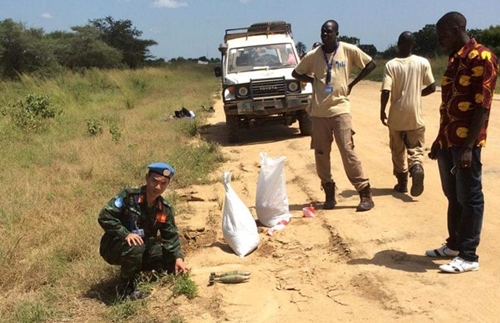 |
|
Lt. Col. Tran Nam Ngan (L) and local forces work with unexploded ordnance in South Sudan. |
Undertaking missions in a faraway country with conflicts, Senior Colonel Trong still bears in mind the image of South Sudan at that time because it was out of his expectation. It was not easy to travel there, while the transportation infrastructure was damaged by conflicts, and the harsh weather and climate conditions. Witnessing the ethnic violence there, he even more appreciated the Fatherland’s peace and was determined to contribute more to the international peacekeeping mission.
Meanwhile, Senior Colonel Tran Nam Ngan recalled, “When we were deployed to the region, the conflicts had just ended, the infrastructure was so bad, especially in terms of communication. During my long field trips for days or weeks, I could not keep in touch with my comrades regularly because in remote areas, we could only communicate via satellite phone. Especially, when going to the areas where armed groups were stationed, we found it hard to make contact with them because their trust in the U.N. force was still not high in general, and they were also afraid that information related to their force and location, their abilities would be exposed.”
The similar memory was also shared by Major Vu Van Hiep (now Colonel and Deputy Chief of the Office of the Vietnam Coast Guard Command), who was the first Vietnamese officer undertaking U.N. peacekeeping missions in both Central Africa and South Sudan where civil wars and conflicts persisted. In April 2015, he was one of the first three Vietnamese officers sent to the U.N. peacekeeping mission at the U.N. Multidimensional Integrated Stabilization Mission in the Central African Republic (MINUSCA). Central Africa has experienced conflict since former President François Bozize was overthrown by Islamist Seleka rebels in March 2013. According to the U.N.’s statistics, the conflict in this five-million-people’s country has killed at least 5,000 people while 190,000 people were forced to flee to neighboring countries.
Colonel Hiep still remembers his very first impressions as he arrived in Central Africa in 2015. From the plane, what caught his eyes were thousands of refugee huts squeezed in one place and there were no houses around. When passing by the refugee camp, separated by a barbed wire fence, he caught the image of boys playing with toy guns made of bamboo sticks. War and conflicts have engraved on their mind. In the Central African Republic, people can buy an AK for USD 100. “In South Sudan, it is normal to see young men herding cows carrying AKs,” shared Hiep.
    |
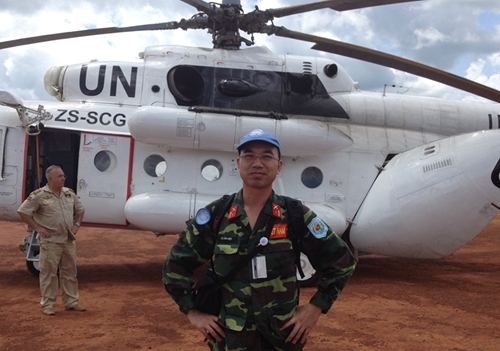 |
|
Major Vu Van Hiep in the Central African Republic |
In 2022, for the first time, the Vietnamese Engineering Company successfully surpassed five other countries to be selected by the U.N. to deploy to the U.N. Interim Security Force for Abyei (UNISFA). Sharing his feelings during his first days in the mission, Major Nguyen Van Thu from the UNISFA Working Team said that desolation and shabbiness were his first impressions about the area as he came to survey the Highway Base in April 2022 to prepare for deployment of Vietnam’s Engineering Company Rotation 1 at the UNISFA.
Previously, Highway Base had been the headquarters of an Ethiopian infantry battalion. The base was built a long time ago (nearly 10 years) and it was mostly degraded with the electrical and water systems severely damaged and no lighting system.
Lieutenant Colonel Bui Duc Thanh (now Colonel and Deputy Director of Military Hospital 175), Director of the Level-2 Field Hospital Rotation 1, noted that in South Sudan under harsh weather conditions, for the first three months, they had to live and work in tents. In South Sudan, water is very scarce. Each person can use only two bags of fresh water every day. The rest is for bathing and daily activities.”
Spreading images of Vietnamese people and country to all over the world
In 2018, Colonel Hiep served as a military observer at the UNMISS. He shared that it was hard as he was assigned to escort convoys of goods and equipment from the U.N. During the task performance, the military observer had to negotiate with troops from both the government and the opposition to be allowed to pass their checkpoints. The guards there all stood bareheaded in the sun with AK47s hanging over their bellies. “Those bare heads could get angry at any time,” said Colonel Hiep.
    |
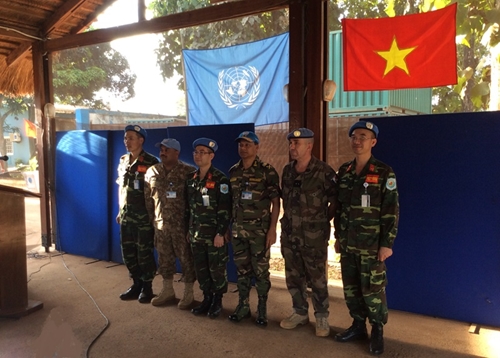 |
|
Major Vu Van Hiep (R) and colleagues hold a ceremony to mark Vietnam's Independence Day in the Central African Republic. |
According to Hiep, the words “VIET NAM” were considered the “passport” during his operation. When he was in Central Africa and South Sudan, not only his colleagues from other countries, but also local people knew about Vietnam. When talking about Vietnam, they chanted, “Vietnam, Ho Chi Minh! Vietnam, Vo Nguyen Giap!” Colonel Hiep was really proud of that. Or the guards at the U.N. staff’s campus, every day when they saw him passing through the main gate, they said, “Vietnam, resilient! Vietnam, resilient!”
Lieutenant Colonel Truong Anh Tuan (now Colonel and Second-in-Command Officer of the VNDPKO’s Training Center) encountered a dramatic situation that could cost him his life during a long patrol trip in 2016 in South Sudan. At that time, he undertook the duty as a liaison officer at the UNMISS. Accordingly, he and his Ethiopian military colleague were in a command vehicle in a convoy of five vehicles.
They were patrolling Melut, an oil production area, which was strictly guarded by South Sudanese government troops. When the delegation was returning to Malakal, they were suddenly stopped by several government soldiers. A second lieutenant asked Tuan to lower the car window and then pointed the AK directly to Tuan’s head, repeatedly shouting, “Who allowed you to go this way?” Tuan’s Ethiopian military colleague was shaking like a leaf. Also his uniform was soaked with sweat. At that time, Tuan decided to negotiate with them.
    |
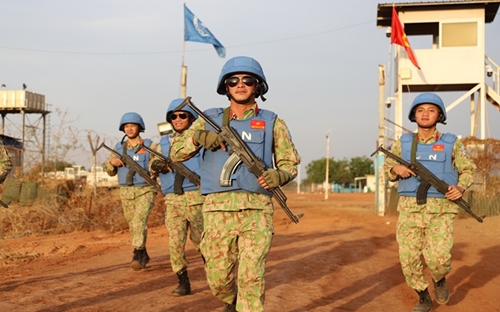 |
|
Vietnamese peacekeepers patrolling barracks in UNISFA |
Tuan then showed all documents including the patrol plan, seal, signature and the permit of the South Sudanese government. However, the second lieutenant said that this was an important area so the delegation was not allowed to pass. Still, Tuan explained, “We are U.N. staff and allowed to go anywhere because there is an agreement between the U.N. and your government. We are here to help your country.” The 30-minute negotiation ended successfully.
“At this time I was quite scared, but I tried to be confident because I knew I can handle the situation,” he added.
Meanwhile, Lieutenant Colonel Pham Van Hieu from the People’s Army Newspaper witnessed a touched conservation showing the military-civilian ties in Abyei, when he joined a mission led by Deputy Defense Minister Senior Lieutenant General Hoang Xuan Chien, Head of the Defense Ministry’s Steering Committee for Participation in U.N. Peacekeeping Operations, to inspect the Vietnamese peacekeeping force in the UNISFA. One day, the mission visited a work site of the Engineering Company Rotation 1 to upgrade a road from Rumajak to Dukara 1. Though the sun was burning hot, the unit’s excavators, bulldozers, scrapers, and rollers continued to work hard.
    |
|
|
|
The Engineering Company Rotation 1 of Vietnam rescues a stranded vehicle in UNISFA, Abyei. |
Welcoming the delegation, Mayor of Abyei Apach Deng Biong said:
- “For years, local people have been facing a number of difficulties, especially bad road conditions. I would like to send my sincere thanks to Vietnamese troops! Vietnam, Ho Chi Minh!”
- “Do you want them to continue to stay in Abyei?” asked General Chien
- “Yes Sir, absolutely, as long as possible!”
- “So, we will try our best. Vietnamese troops are here to help people in Abyei,” the general replied.
On this occasion, on behalf of the local people, the mayor handed over a breeding cow to the Vietnamese Engineering Company Rotation 1 to show their gratitude to the Vietnamese engineers for their help. General Chien received the gift, affirming that with the cow presented by local people, the Vietnamese peacekeeping force would raise to a herd of cows.
    |
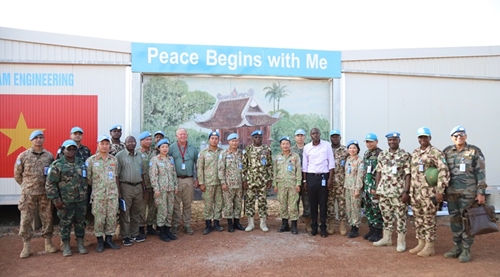 |
|
Leaderships of UNISFA and the Engineering Company Rotation 1 of Vietnam in a joint photo with the picture of the One-pillar Pagoda (a symbol of Hanoi, Vietnam) in Highway Base. |
It is clear to say that Vietnam’s peacekeeping force is relatively young but has made significant contribution to international peacekeeping activities over the last 10 years, winning the high evaluation from U.N. leaders as well as administrations and people in the host countries. Hence, Senior Colonel Nguyen Manh Thang, Director of the VNDPKO, affirmed that the result evidences the Party and State’s right policy of sending Vietnamese personnel to undertake such a noble task since June 2014, helping to successfully carry out the foreign policy of independence, self-reliance, multi-lateralization and diversification of international relations, and being a responsible and active member of the U.N. and international community.
“Considerable efforts, sacrifice, mettle, and creativity of the units and individuals directly performing duties have helped spread the images and values of the Vietnam People’s Army in particular and Vietnamese people and country in general to all over the world,” concluded Senior Colonel Thang.
(to be continued)
Written by Tran Hoai - Minh Anh - Quynh Oanh